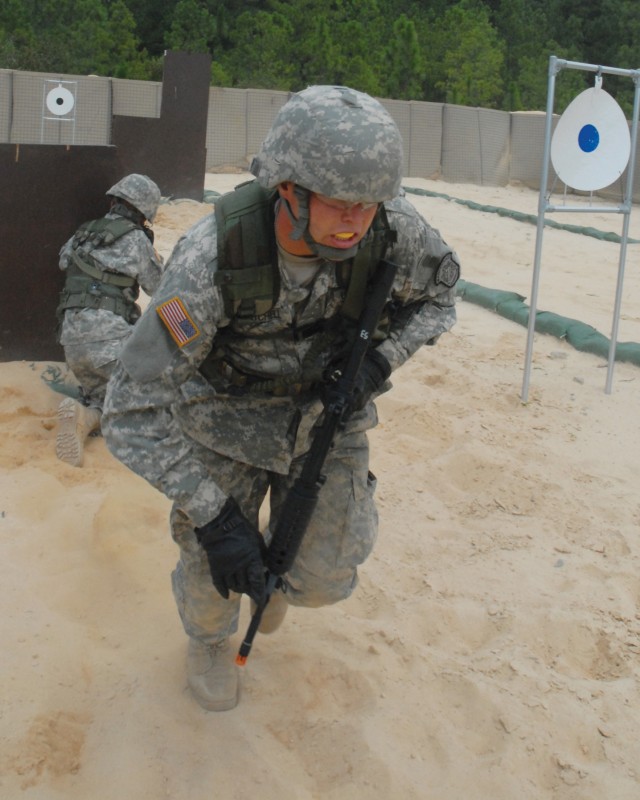FORT JACKSON, S.C. -- What began as a popular form of civilian entertainment is being tested on Fort Jackson as a possible new way to train Soldiers preparing to head to a combat zone.
The 187th Ordnance Battalion is operating a pilot program designed to test the feasibility of using Airsoft weapons to train Soldiers to cope with real-world combat situations such as forward operating base operations and force protection.
Airsoft weapons are replicas of their military counterparts, but fire plastic pellets instead of bullets. Airsoft is widely used by civilians who enjoy organizing military simulations and historical reenactments.
Training cadre with the unit are finding that Airsoft is an ideal way to teach Soldiers valuable lessons about combat.
"It gives them more realistic, outcome-based training," said Sgt. 1st Class Richard Hunt, module chief for the battalion. "Now they know when they get hit during a training exercise."
The battalion has been using Airsoft weapons since the spring at its field training site where soldiers learn basic combat tactics in an urban environment. Like Hunt, all of the cadre at the FTX site are combat veterans. Hunt said the Airsoft weapons give the training another level of sophistication and realism that is hard to attain with other training tools such as the Multiple Integrated Laser Engagement System, which has been in use for years.
Soldiers at the site practice reflexive fire and other tactical skills while armed with replica M-4s, M-9s and M-249s, the weapons they most likely will use in combat. While practicing tactical movements, such as clearing rooms or exiting a vehicle in an ambush, the Soldiers come under fire from Airsoft weapons. The feedback is instant if a Soldier makes a mistake.
"I got hit and it stung a little bit," Pvt. Joshua Kolometz said after undergoing reflexive fire training. "This gives you a realistic feel of what combat will be like."
That's exactly what the Airsoft training program is intended to impart, said Company B's 1st Sgt. Chris Arnold. "This has a huge impact on training realism," Arnold said. "If you make a mistake during training, you know you've made a mistake."
Maj. Benjamin Kratz, the battalion's executive officer, said data is being collected on Fort Jackson's Airsoft pilot program so that it can be determined if it should be implemented Army wide.
Kratz said initial data shows that Airsoft ammunition is much cheaper to use in training than the traditional blank ammunition used with MILES or equipping weapons with specially-designed bolts to fire paintball rounds. Kratz said one blank M-16 round costs as much as 32 Airsoft rounds. The Airsoft rounds used on Fort Jackson are biodegradable, which is a benefit over using traditional blank rounds.
"We go through a lot of blank rounds here on Fort Jackson," Kratz said. "What the data doesn't show yet is how long the Airsoft weapons last and how much the replacement parts and other ongoing costs are."
Kratz said the Airsoft training so far has accomplished what was intended.
"This is the last stop before Soldiers go to their gaining units downrange," he said. "What they learn here will save lives."




Social Sharing